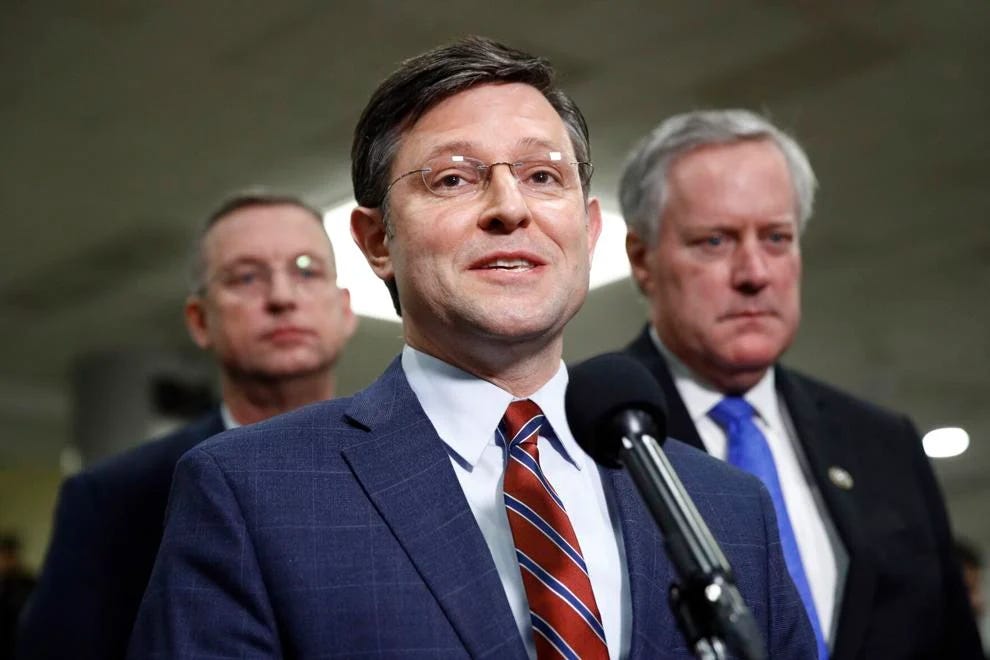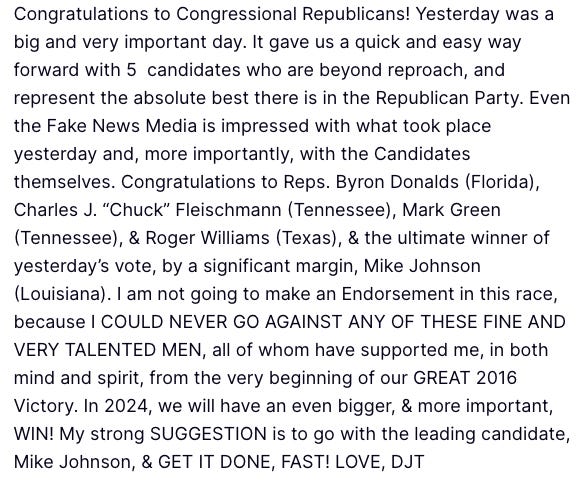Late Tuesday night, House Republicans chose Louisiana Rep. Mike Johnson as their latest victim nominee to be Speaker of the House.
And, unlike the past few people they’ve picked, Johnson’s chances of actually getting 217 Republican votes on the House floor seem — dare I say it — good?
Wrote POLITICO’s Playbook Wednesday morning:
Could House Republicans finally be on the cusp of a breakthrough in their search for a speaker?
It sure feels that way: Late last night, Rep. MIKE JOHNSON (R-La.) became the latest GOP conference nominee, and what was different this time wasn’t what was said but what wasn’t: No backbiting, no ultimatums, no snarky comments to reporters — just cheers and an overwhelming sense of relief.
Now, of course, this is House Republicans we are talking apart. The same group who ousted then Speaker Kevin McCarthy with no plan to replace him — and have spent the past three weeks searching in the wilderness for someone, anyone, to replace him.
So, until Johnson actually secures those 217 votes, it’s probably safe to be at least slightly skeptical that this debacle is well and truly over for House Republicans.
UPDATE, 2 pm eastern: Johnson was elected Speaker on the first ballot. He received the votes of all 220 Republicans in the chamber.
But, let’s assume for a moment that Johnson does claim the Speakership. What would it mean? That an architect of 2020 election denialism in the House now holds the chamber’s top job.
See, Johnson wasn’t just one of 139 House Republicans who voted to object to the certification of the 2020 election. He played a much deeper role in all of it.
Here’s the New York Times on Johnson:
In formal statements justifying their votes, about three-quarters relied on the arguments of a low-profile Louisiana congressman, Representative Mike Johnson, the most important architect of the Electoral College objections.
On the eve of the Jan. 6 votes, he presented colleagues with what he called a “third option.” He faulted the way some states had changed voting procedures during the pandemic, saying it was unconstitutional, without supporting the outlandish claims of Mr. Trump’s most vocal supporters. His Republican critics called it a Trojan horse that allowed lawmakers to vote with the president while hiding behind a more defensible case.
Even lawmakers who had been among the noisiest “stop the steal” firebrands took refuge in Mr. Johnson’s narrow and lawyerly claims, though his nuanced argument was lost on the mob storming the Capitol, and over time it was the vision of the rioters — that a Democratic conspiracy had defrauded America — that prevailed in many Republican circles.
Johnson’s argument boiled down to this: The Constitution says that only state legislatures are in charge of setting up the rules for how electors are chosen. But, the vast majority of voting changes — due to the Covid-19 pandemic — put in place in 2020 were done by governors and secretaries of state, raising the question as to whether those changes were legal and permissible.
But, in the days immediately after the election, Johnson was less legalistic in his objection to the election.
“There is still reason for hope” that Mr. Trump might win, he told a conservative Louisiana talk radio host a week after the election, citing “credible allegations of fraud and irregularity.” Charges that voting machines had been “rigged” had “a lot of merit,” he asserted in another radio interview.
“When the president says the election is rigged, that’s what he’s talking about — that the fix was in,” Mr. Johnson added.
Johnson eventually was the ringleader in Congress of an amicus brief filed with the Supreme Court in support of a challenge brought by Texas that would have essentially invalidated the vote in four swing states in 2020.
“President Trump called me this morning to let me know how much he appreciates the amicus brief we are filing on behalf of Members of Congress,” Johnson tweeted on December 9, 2020. “Indeed, ‘this is the big one!’”
The Supreme Court threw the case out.
In an interview with the New Yorker after the SCOTUS decision, Johnson suggested the problem with the case wasn’t the merits but rather that the president had picked the wrong lawyers.
“In this case, it appears that some of the larger law firms that might have been lined up early on, for whatever reason backed out, and Rudy Giuliani was in charge,” said Johnson. “And I don’t think their army of lawyers was large enough. I don’t know. It’s a question, not a statement, but did they have enough lawyers who had experience in election-fraud challenges?”
Following his victory in the House conference, Johnson held a brief media availability — while surrounded by his colleagues. He was asked by a reporter about his election denialism. Before Johnson had a chance to answer, the reporter was booed and told to “shut up.”
So, yeah.
The truth of the modern Republican party is that election denialism is now a badge of honor as opposed to a black mark on a Member of Congress’ record. Trump has turned a belief that that 2020 election was somehow stolen from him into a litmus test for whether you are a real conservative or just a RINO.
Trump took down Minnesota Rep. Tom Emmer’s bid for Speaker on Tuesday, at least in part due to the fact that Emmer broke with the majority of his colleagues and voted to uphold the 2020 results.
And, on Wednesday morning, Trump issued a quasi-endorsement of Johnson’s candidacy via Truth Social.
Johnson had long courted Trump’s support. They were both elected in the 2016 election. During the first impeachment of Trump — for his “perfect” phone call with Ukrainian President Volodymyr Zelensky — Johnson became a regular television presence, defending Trump against the allegations.
As the Shreveport Times wrote:
Johnson granted nearly 50 TV interviews during the impeachment saga, many on networks the congressman described as "unfriendly territory."
“The president monitors all of that and commented on it frequently to me,” Johnson said.
For his service, Johnson was chosen as one of Trump’s chosen representatives from the House during his Senate trial. The president was acquitted.
While on the campaign trail in New Hampshire with Trump in 2020, Johnson marveled at his access to the president. “It's surreal; when I call him, he calls back within a couple of hours," Johnson said. “I believe he sees me now as a trusted ally.”
If Johnson does become Speaker then, it further cements this reality: This is Trump’s party. And election denialism sits at the beating heart of it.






And what happens the moment Johnson touches reality? He has to negotiate with the Senate and President on appropriations in November. How long will the shutdown last, given that the House Republican caucus lives in a bubble and reality kills them? Will he make it to December? January? The moment he negotiates an appropriation deal, he’s dead.
Oh boy, the guy's excited that Trump will call him back within a couple of hours. I hope this ends as poorly for him as it did for the others.